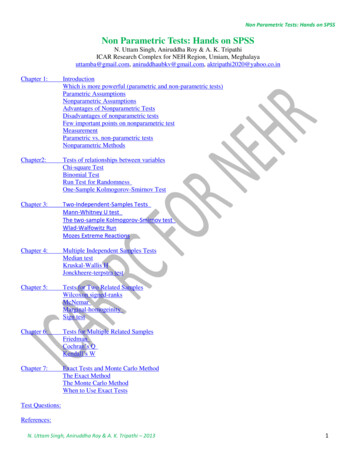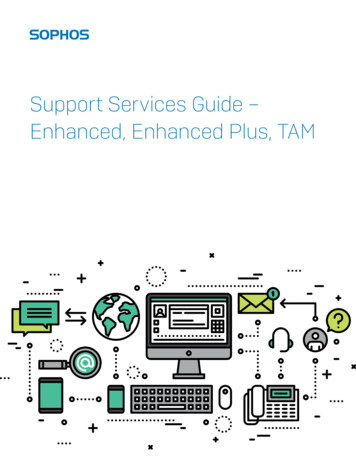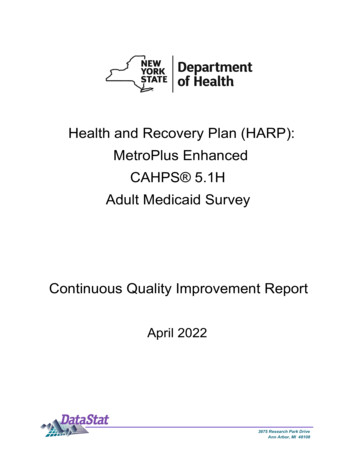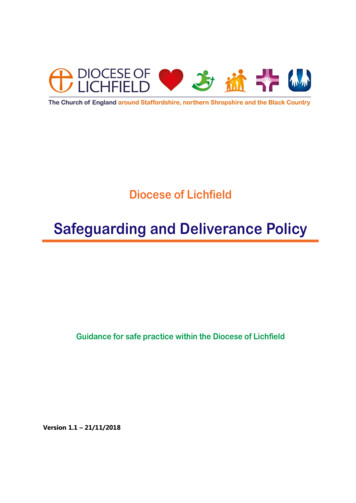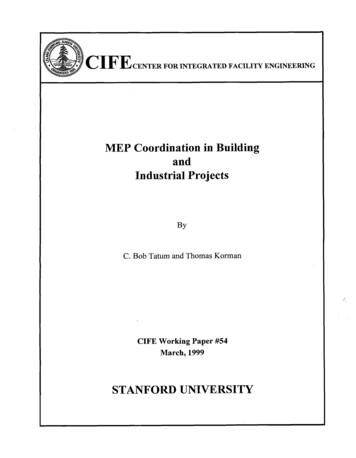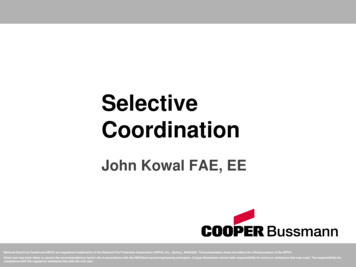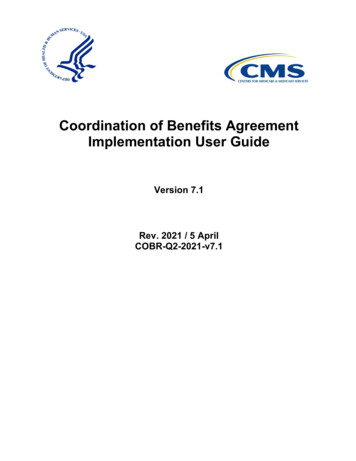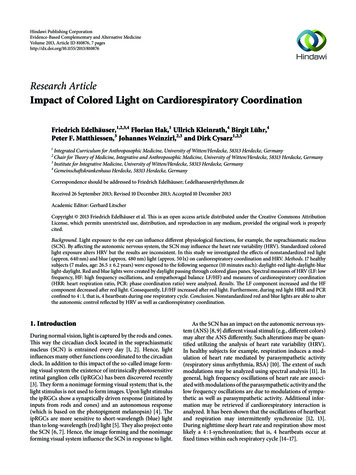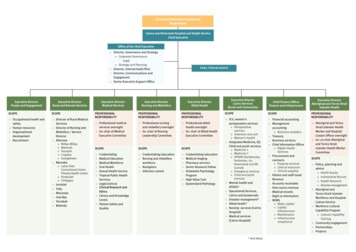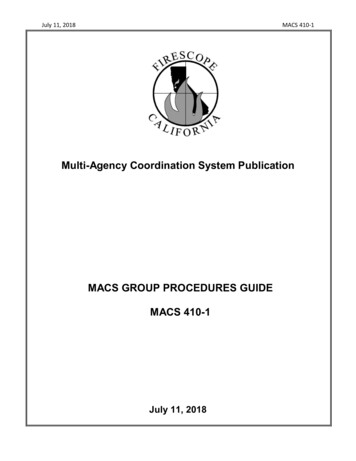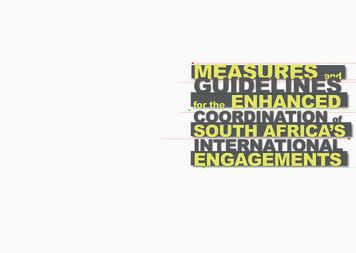
Transcription
MEASURES andGUIDELINESfor theENHANCEDCOORDINATION ofSOUTH AFRICA’SINTERNATIONALENGAGEMENTS
International Cooperation, Trade and Security Cluster (ICTS)International Cooperation, Trade and Security Cluster (ICTS)Content1. Introduction84.2.4VIP facilities at international airports30.2. Consultative Forum on International Relations (CFIR)94.2.5Health313. Calendar of events and reporting database114.2.6Assistance rendered by DIRCO314. Guidelines and manuals124.2.7Assistance by missions abroad314.2.8Payments on behalf of delegations abroad32Subsistence and Transport Allowance334.1Guidelines on South Africa’s participation in international .conferences, summits and meetings124.2.94.1.1Overview of South Africa’s international relations124.2.10 Reports by stakeholders334.1.2Guidelines for participation15.4.2.11 General hints334.1.3Conduct during the conferences/summits/meetings23.4.34.1.4Budgetary arrangements26.4.2Guidelines for official visits abroad27.4.2.1Communication with the Department of International27Relations and Cooperation284.2.3. Passports and visas294Measures and Guidelines for the Enhanced Coordination ofSouth Africa’s International Engagements35missions abroad4.4Guidelines on interaction with foreign missionsand international organisations accredited to37South Africa4.5Pre-visit preparation4.2.2Guidelines on the role and functions of South African .Policy on the nomination and election of candidates tointernational organisations39Measures and Guidelines for the Enhanced Coordination ofSouth Africa’s International Engagements5
International Cooperation, Trade and Security Cluster (ICTS)International Cooperation, Trade and Security Cluster (ICTS)AnnexureSAnnexure A:54Undertaking as member of the South African delegationAnnexure B:55Contact form for official visits abroadRequest for assistance to be rendered by DIRCOImportant checklistAnnexure C:62Processing of payments on behalf ofpartner-departments, other spheres of government and other stateinstitutions for official visits abroad6Measures and Guidelines for the Enhanced Coordination ofSouth Africa’s International EngagementsMeasures and Guidelines for the Enhanced Coordination ofSouth Africa’s International Engagements7
International Cooperation, Trade and Security Cluster (ICTS)International Cooperation, Trade and Security Cluster (ICTS)2. Consultative Forum on International Relations(CFIR)TPresident Jacob Zuma at the United Nations1. INTRODUCTIONThe Cabinet Lekgotla of January 2007 requested the InternationalRelations, Peace and Security (IRPS) Cluster to submit guidelinesto Cabinet on establishing more effective measures and mechanisms tocoordinate the conduct of international relations and the implementationof South Africa’s foreign policy.he CFIR is an intergovernmental structure comprising seniorofficials from all three spheres of government. The senior officialswill meet at least twice annually to ensure proper information-sharingand coordination. The purpose of this forum will be: sharing information regarding all stakeholders’ internationalinvolvements i.e. policy statements, visits abroad, conferences,summits, incoming visits, etc. foreign policy guidance on international issues planning and coordinating incoming and outgoing internationalvisits discussing pressing issues, which will enable government toconvey information in a consistent and principled manner, onkey foreign policy issues to various levels of government possible private-sector/civil-society engagement and nationaloutreach programmes.In the course of 2007, the cluster conducted broad consultations andheld two workshops involving all three spheres of government with theaim to develop a product that will improve the coordination of SouthAfrica’s foreign policy interactions and enhance the benefit which SouthAfrica’s international engagement brings to all parties involved.The Department of International Relations and Cooperation (DIRCO)was tasked with developing a set of measures and guidelines, applicableto international relations practitioners in all three spheres of government,which would realise this objective. DIRCO’s proposals in this regardwere submitted for consideration during two workshops which were heldin February and June 2008, involving international relations practitionersfrom all spheres of government.After these extensive consultations with all role players involved in SouthAfrica’s international relations, the following recommendations weresubmitted to the International Cooperation, Trade and Security (ICTS)Cluster on 4 March 2008.8Measures and Guidelines for the Enhanced Coordination ofSouth Africa’s International EngagementsPresident Jacob Zuma with the President of the European Council, President Herman van Rompuy,and the President of the European Union (EU) Commission, President José Manuel Barosso, at theEU-South Africa SummitMeasures and Guidelines for the Enhanced Coordination ofSouth Africa’s International Engagements9
International Cooperation, Trade and Security Cluster (ICTS)International Cooperation, Trade and Security Cluster (ICTS)It must be emphasised that this forum will not be a policy-makingmechanism – as policy remains the mandate of the ICTS Cluster andfinally the sole prerogative of Cabinet. In fact, the CFIR will derive fromand feed back into the ICTS Cluster.After each meeting of the CFIR, a report will be compiled for theinformation of and consideration by the ICTS Cluster and other clustersof government, where necessary. A further option is that the ICTS Clustermay want to submit this report to Cabinet.The information-sharing element and logistics support planning of thisbody is critical. The meetings will be organised and chaired by DIRCO,and secretariat services will also be provided by DIRCO.The proposed new coordination structure is graphically illustrated ingraph 1:Graph 1CABINETICTS CLUSTERMinister Maite Nkoana-Mashabane with US Secretary of State Hillary Clinton3. Calendar of events and reporting databaseCFIR DIRCO entsThe arrows indicate the channels of communication in the new coordination structure.10Measures and Guidelines for the Enhanced Coordination ofSouth Africa’s International Engagements A 12-monthly forecast calendar on international interaction,corresponding to every financial year to coincide with thegovernmental planning cycle, will be developed from the abovementioned interdepartmental meetings and additional feedbackfrom stakeholders. To avoid confusion, the calendar will bedivided in two, covering incoming and outgoing events.The custodian of the calendar will be DIRCO, and the calendarof events will be coordinated and maintained by DIRCO.Departments, provinces, local governments and otherstakeholders will provide continuous updates, while DIRCOupdates the calendar and circulates it to all stakeholders twice ayear, namely in April and October.Measures and Guidelines for the Enhanced Coordination ofSouth Africa’s International Engagements11
International Cooperation, Trade and Security Cluster (ICTS) The second CFIR meeting of any given year would be to assessprogress and follow-up actions, share information and plan theactivities for the rest of the year.Stakeholders will be required to present reports within onemonth of an international visit/engagement with foreign actors.Reports will be placed on an information database as to allow foreffective follow-up by DIRCO where necessary, and to ensurethe efficient use of limited resources.International Cooperation, Trade and Security Cluster (ICTS)States now meet and forge closer ties on a bilateral level more thanever before. Regional ties are also on the increase as a strategyto positively deal with the challenges of globalisation. The regionaleconomic communities (RECs) in Africa such as the SouthernAfrican Development Community (SADC), Economic Communityof West African States (ECOWAS), Common Market for Easternand Southern Africa (COMESA) etc. are classic examples of this.B4. Guidelines and manualsThis document should be read in conjunction with the followingdocuments which serve as additional guidance with respect to theconduct of South Africa’s international engagements: Practical Guide and Procedures for the Conclusion onAgreements (published by the Office of the Chief State LawAdviser – International Law, DIRCO Practical Guide and Procedures for the Binding of Agreements(published by the Office of the Chief State Law Adviser –International Law, DIRCO The Strengthening of Economic Diplomacy and the Challengesof Coordinated Marketing South Africa Abroad (presented toand approved by the July 2007 Extended Cabinet Meeting). In addition, the following detailed guidelines have been developed throughan extensive consultation process across all spheres of government:4.1Guidelines on South Africa’s participation in internationalCconferences, summits and meetings4.1.1A.12Overview of South Africa’s international relationsThe nature of conducting bilateral relations between states haschanged dramatically within the last decade. Bilateral diplomaticrelations now encompass a myriad of different fields linkedto globalisation. Many states have now developed bilateralcooperation partnerships with each other, which take differentforms e.g. binational commissions (BNCs), bilateral technicalcooperation agreements, bilateral consultative mechanisms, etc.Measures and Guidelines for the Enhanced Coordination ofSouth Africa’s International Engagements The contemporary international, political and economic system hasevolved in a multiplicity of fora, conferences, summits and meetings,both multilateral and bilateral. For South Africa’s effectiveness andstrategic positioning vis-à-vis this environment, it is imperative thata structured policy approach be adopted which would:govern a coordinated approach and participation in this newinternational environmentensure the implementation of a structured approach to internationalmeetings, predicated on a thorough preparatory process (e.g.predictable meeting cycle preparation) with clear objectives,directives and strategies to positively influence the outcome ofthese international conferences, summits and meetings, consistentwith South Africa’s foreign policy prioritiesensure that only officials with clearly defined roles, based onsubstantive understanding and with the ability to lead and managethe dynamics within the delegation, should be authorised toparticipate in these meetings.South Africa’s greatest challenge regarding internationalconferences, summits and meetings thus far has been in thefollowing areas:the size of delegationsthe absence of preparations at national level, resulting in delegationsmeeting for the first time at the conference itselfdelegations departing for meetings without ministerial approval onwhat policy positions should be pursuedpossible tensions within the delegation about who should takeleadershipthe tendency to reduce the role of DIRCO to that of a mere logisticalcoordinator.Measures and Guidelines for the Enhanced Coordination ofSouth Africa’s International Engagements13
International Cooperation, Trade and Security Cluster (ICTS)DEFInternational Cooperation, Trade and Security Cluster (ICTS)The increased participation in bilateral and multilateralnegotiations of South African delegations, be it through thejoint BNC process or at other multilateral fora, needs carefulmanagement to ensure a coherent and coordinated approachas more and more agreements are concluded flowing fromthese negotiations. DIRCO has the responsibility of conveningBNCs where bilateral negotiations take place. Proper planning,preparation and participation in these meetings, as well aseffective follow-up action after such meetings, have becomeessential.Multilateral negotiations of new international agreements/regimes under the auspices of international organisations areconstantly taking place and South Africa’s participation in thesenegotiations has increased.In accordance with international practice and traditionaldiplomacy (the Vienna Conventions on the Law of Treaties, theVienna Conventions on Diplomatic and Consular Immunities),DIRCO is the constitutionally mandated authority responsiblefor taking leadership and managing South Africa’s foreign policy.Consistent with this mandate, DIRCO is expected to be the leaddepartment in all matters relating to participation in internationalconferences, summits and meetings.GIn view of the above, DIRCO has produced the following policydirectives:4.1.2.Guidelines for participationAGeneralA.1South Africa’s foreign policy is generally interpreted as theexternalisation of its domestic policy i.e. a better South Africa,a better Africa and a better world. The values that underpinthe country’s foreign policy include democracy, human rights,human dignity, non-racialism, non-sexism and prosperity forall. The custodian of South Africa’s domestic policy, particularlyin line with the values espoused above, are the national linefunction of departments.A.2All multilateral meetings and negotiations take place within apolitical context: multilateral negotiations involve a complexityof issues with strong political overtones, while bilateral meetingsclosely involve the political relations between the countriesconcerned. Some of the conferences/negotiations can be highlytechnical in nature.A.3Due to the technical nature of some of the conferences/negotiations, the decision as to which department should assumethe role of lead department in each case will be determined bythe:level of expertise in relevant departments in relation to technicalissues involvedextent to which there is foreign policy or foreign relationsinvolvementprovisions of the constitutions of some of the organisations thatmight indicate who is expected to act as head of delegation.Thus, decisions in this respect need to be made on a case-bycase basis by DIRCO in consultation with the concerned linefunction departments. A.4The African Union headquarters in Addis Ababa, Ethiopia14Measures and Guidelines for the Enhanced Coordination ofSouth Africa’s International EngagementsThe lead department will guide the preparation ofSouth Africa’s participation in international conferences andnegotiations with the support of all other stakeholders who have beenidentified as contributing players.Measures and Guidelines for the Enhanced Coordination ofSouth Africa’s International Engagements15
International Cooperation, Trade and Security Cluster (ICTS)A.5As DIRCO is responsible for South Africa’s overall foreignrelations, it should be consulted in all instances of South Africanparticipation in international conferences and negotiations,irrespective of whether such conferences and negotiations areheld inside South Africa or abroad.BPreparatory activities prior to conferences/summits andmeetingsB.1B.2B.316DIRCO and the ICTS Cluster assume the responsibility forensuring that thorough preparations are undertaken priorto participation by South African delegations in internationalconferences.The measure of such preparation will manifest in the quality ofthe directives, the clarity of the objectives and a clear strategyon how to influence outcomes of conferences, summits andmeetings. All DIRCO desk officials have a responsibility tosubmit to all the departmental structures (BMCs, DGF, EMC,ICTS Cluster and Ministry) a detailed strategy, inclusive of allthe national preparatory processes, aimed at ensuring SouthAfrica’s positive influence in all outcomes of internationalconferences, summits and meetings.In the event that it is determined that South Africa has marginalinterest in a specific conference, a decision shall rest with thesenior management whether South Africa should participate or not.All desk officials must provide a coherent networking system whichbrings all the relevant national actors together. This networking is ata functional level and should form part and parcel of the responsibilityof all desk officials within DIRCO. Officials must maintain an upto-date contact list for every thematic issue within their portfoliowhich reflects the details of all national partners and stakeholdersassociated with their activities and who in most cases, shall formpart of the delegations to conferences, summits and meetings. Itshould be understood that it is these partners and stakeholderswho are instrumental in the formulation of our national positions ona variety of issues, which are subjects of discussion at internationalconferences, summits and meetings.Measures and Guidelines for the Enhanced Coordination ofSouth Africa’s International EngagementsInternational Cooperation, Trade and Security Cluster (ICTS)B.4Proper planning is essential to maximise South Africa’s abilityto advance its interests at conferences and negotiations. Thepre-identification of all conferences arising in the following yearis necessary so that proper planning can take place. Suchplanning should take place in the context of the ICTS Cluster,whose various committees should include this activity in theirwork plans.CRegardless of who the technical lead department is, it isrecommended that the specific department should be inconsultation with DIRCO to:C.1Identify all relevant sectors of interest in the conference ornegotiations, including sectors such as the economy, industry,agriculture, mining, forestry, tourism, environment, health, etc.C.2Identify stakeholders and expertise within the public and privatesector, including the provinces, academia, scientists, industry,non-governmental organisations (NGOs), community-basedorganisations (CBOs) and other experts with relevant expertiseor interests.C.3Establish an interdepartmental substance committee incases where the interests of several departments andother stakeholders are involved. The purpose of such aninterdepartmental substance committee is to facilitateinterdepartmental consultation and policy discussion.C.4Arrange for interpretation facilities, especially where thenegotiations are of a technical nature and interpreters are notprovided, as it may be the case at multilateral negotiations.DThe Interdepartmental Substance Committee will take noteof the views expressed by all stakeholders on issues of concernand on policy positions that South Africa should consideradopting. This is particularly the case when the internationalconventions/agreements will have implications for them.Measures and Guidelines for the Enhanced Coordination ofSouth Africa’s International Engagements17
International Cooperation, Trade and Security Cluster (ICTS)EThe regional views, such as those of the SADC, the AfricanGroup, and G77 China must be established and taken intoconsideration. Regional positions are usually formulated atregional level before the negotiations on the same issues takeplace at international level. The lead department, when it is notDIRCO, should consult DIRCO in this regard.FInternational Cooperation, Trade and Security Cluster (ICTS)G.1 It is important that consistency prevails with regard to policypositions adopted at regional and international level. SouthAfrica cannot advance different positions on the same issues atdifferent fora.G The Interdepartmental Substance Committee should, amongother things:Obtain and study the relevant conference documents andarrange preparatory meetings of delegates.Identify and prioritise the major issues of concern to SouthAfrica.Take notice of government policy on the issues that will form thefocus of the conference and negotiations.Ensure that planning is within the parameters of existinggovernment policy. In this regard, the balance of nationalinterests represented by different government departments, aswell as views expressed by the provinces, and private and nongovernment sectors should be taken into account.Refer any questions regarding government policy or any policyrecommendations on significant issues to the relevant Minister(s)for clarification or endorsement.Take regional positions into account.Consult with principals on whether South Africa should draft orco-sponsor any resolutions or support candidatures.If differences occur in respect of decisions to be taken, the viewsof DIRCO must be reflected and disputes need to be referredto higher levels within DIRCO and the line-function department(Director-General [DG] or higher).Prepare briefing documents or directives based on the policydecisions. can assist with the interpretation of the Rules of Procedures.G.2 18Measures and Guidelines for the Enhanced Coordination ofSouth Africa’s International EngagementsIn general terms, these directives should:Outline the major objectives and priorities for the conference ornegotiations.Provide specific and detailed instructions in relation to keypriority issues.Provide more general instructions in relation to lower priorityissues.Provide relevant background information, which the delegationmay need during the conference or negotiations.Prioritise issues to assist the delegation to allocate resourcesappropriately.Determine the size of the delegation on the basis of the criteriaoutlined by the Interdepartmental Substance Committee.Clearly allocate specific tasks to specific members of thedelegation.Decide on lobby actions. Where advance lobby actionsare required in support of South African policy positions orcandidatures, DIRCO will instruct its missions to initiate this bymeans of bilateral or multilateral actions. DIRCO will keep otherinterested parties informed of progress in this regard.Study the Rules of Procedure, since a thorough knowledge ofthis document is required to optimise the impact of a country’sparticipation in a conference. All delegates should familiarisethemselves with the Rules of Procedure of the conference inquestion. While the Rules of Procedure for the United Naitons(UN) and its functional committees, albeit very elaborate, arefairly standardised, most other organisations have their ownRules of Procedure. The Office of the Chief State Law Adviser (IL)Decide on the composition of the delegation. In this regard, thefollowing should be noted:The size of delegations should be limited to representativesfrom government departments who can make a meaningfulcontribution and have a specific duty to perform.A legal adviser from the Office of the Chief State Law Advisershould be included where necessary.Members of Parliament, provincial legislatures and provincialMeasures and Guidelines for the Enhanced Coordination ofSouth Africa’s International Engagements19
International Cooperation, Trade and Security Cluster (ICTS) G.3 G.4government officials may from time to time be included indelegations. Any expenses (travel, accommodation, etc.)related to their participation should be covered by the relevantparliamentary or provincial budgets.Delegates who have completed the tasks assigned to them canreturn home and need not stay until the end of the meeting.Delegates should familiarise themselves with these directives:Special experts and/or specialist-interested representatives fromNGOs can be considered to become members of delegations iftheir inclusion can help further the interests of South Africa. Thefollowing considerations should apply in this assessment: the degree to which a non-governmental representativecould bring technical expertise to the delegation whether such participation would increase the NGO’sunderstanding of relevant international issues whether NGO participation might assist in theimplementation of the final international agreements andinstruments.Where International Cooperation, Trade and Security Cluster (ICTS)itisdecidedtoinclude20representatives on official delegations, such representatives:must agree to adhere to the directives of the delegation andaccept the authority of the leader of the delegationmust respect the confidentiality of any confidential documentationmade available to them, and of all related discussions, whetherwithin the delegation or between delegationsshould provide the delegation with a copy of any report theymay prepare on their participation in the meetingmust sign an undertaking agreeing to the above conditions priorto approval being given for their participation in the delegationAt some international conferences, provision is made forseparate NGO participation. In such cases, the NGOs areresponsible for their own costs and other arrangements. DIRCOmay advise them on practical matters.Measures and Guidelines for the Enhanced Coordination ofSouth Africa’s International EngagementsG.6 non-governmental(Please see Annexure A).G.5DIRCO will, among other things: advise on the political background relevant to the meeting provide up-to-date analyses from an international perspectiveon key issues and objectives undertake any lobby actions that might be necessary supply official documentation if necessary assist in providing information on organisational issues, transportand accommodation arrangements where necessary provide any additional information required for the purposes ofthe conference/negotiations, including organisational matters.If private-sector or other non-governmental experts are to take part ininternational conferences, facilitate their accreditation in an appropriatemanner. It is also the responsibility of DIRCO to prepare the credentialsof the delegation to multilateral negotiations/conferences wherethey are required, in order for the Minister of InternationalRelations and Cooperation to sign and deposit the credentialsat the correct depository at the start of the proceedings.The full names of all participants need to be reflected on thecredentials. No name will be included in the credentials if therole of that member of the delegation has not been clarified andmotivated.In all cases, the composition and leadership of delegationsshould be determined in advance of the meeting.G.7It is accepted international practice that the leader of thedelegation will be the South African Permanent Representativeaccredited to an organisation (UN, African Union [AU]); unlesssome other arrangement has been agreed upon in consultationwith DIRCO.G.8The Head of Mission in the country where the meeting is takingplace can also act as head of the delegation.G.9Where a Minister or Deputy Minister attends negotiations orconferences, he or she may assume the role of leader of thedelegation, regardless of his or her portfolio responsibilities.Measures and Guidelines for the Enhanced Coordination ofSouth Africa’s International Engagements21
International Cooperation, Trade and Security Cluster (ICTS)International Cooperation, Trade and Security Cluster (ICTS)Leaders of G20 at the Seoul Summit 2010G.10G.11 22A deputy leader of the delegation should in all cases be identifiedto assume responsibility in the absence of the leader of thedelegation.The size of the delegation will be determined by thefollowing issues:number of seats at the summit/conferencethe number of breakaway sessions influencing the outcome ofthe summit/conferenceexpertise within the delegation; it is not necessary to havemany experts travelling to a summit/conference if thoroughpreparations have been made and included in the briefingdocument.Measures and Guidelines for the Enhanced Coordination ofSouth Africa’s International Engagements4.1.3Conduct during the conferences/summits/meetingsAThe leader of the delegation or, in his/her absence, the deputy leader of the delegation will be responsible for:Paying a courtesy call on the Head of the South African Missionin the country.Making all policy decisions required during the meeting, includingthe co-sponsoring of resolutions, in consultation with DIRCO asrequired and coordinating all reporting to headquarters.Deciding on requests for support of policy positions orcandidatures. When such requests are received, the mattershould be considered in very close cooperation with DIRCO,since wider foreign policy issues or issues related to internationalrelations or quid pro quos may be involved.Measures and Guidelines for the Enhanced Coordination ofSouth Africa’s International Engagements23
International Cooperation, Trade and Security Cluster (ICTS) Foreign policy issues or issues related to international relationsthat may arise during the course of a conference must in allcases be managed in cooperation with DIRCO.CDIRCO will have the following responsibilities during theconference or negotiations:all issues involving foreign policy or international relations,including lobbying of capitals and relevant organisations andinstitutions as well as international organisationsall international legal issues in relation to treaties, conventions,etc.representation in and liaising with intergovernmental groupingsof which South Africa is a member (SADC, African Group,G77)providing advice on support for policy positions andcandidaturesliaising with the UN, AU or other relevant secretariatsorganisational issues such as speakers’ lists, documentationand conference procedureliaising with relevant South African diplomatic missionsprotocol g regular delegation meetings.Supervising the lobbying of other delegations.Allocating responsibilities and resources within the delegation.Media liaison and interviews. No new policy statements withforeign relations implications may be made at internationalconferences unless they are cleared with DIRCO.BC.1International Cooperation, Trade and Security Cluster (ICTS)The local South African Diplomatic Mission will, if required, beresponsible for:Advising on and facilitating communication between thedelegation and South Africa, including the dispatching ofreports.Assisting with documentation and certain administrativearrangements.Additional assistance with secretarial support, local transport,Measures and Guidelines for the Enhanced Coordinati
10 Measures and Guidelines for the Enhanced Coordination of South Africa's International Engagements International Cooperation, Trade and Security Cluster (ICTS) South Africa's International Engagements 11 International Cooperation, Trade and Security Cluster (ICTS) It must be emphasised that this forum will not be a policy-making
